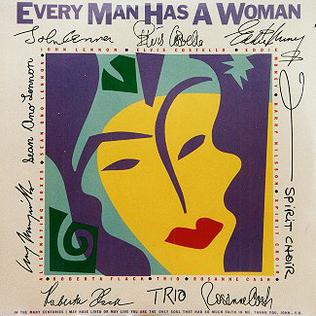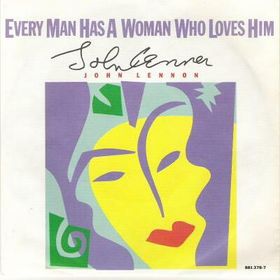
Unfinished Music No. 2: Life with the Lions is the second of three experimental albums of avant-garde music by John Lennon and Yoko Ono, released in May 1969 on Zapple, a sub label of Apple. It was a successor to 1968's highly controversial Unfinished Music No. 1: Two Virgins, and was followed by the Wedding Album. The album peaked in the United States at number 174, 50 places lower than the previous album. The album, whose title is a play on words of the BBC Radio show Life with The Lyons, was recorded at Queen Charlotte's Hospital in London and live at Cambridge University, in November 1968 and March 1969, respectively. The Cambridge performance, to which Ono had been invited and to which she brought Lennon, was Lennon and Ono's second as a couple. A few of the album's tracks were previewed by the public, thanks to Aspen magazine. The album was remastered in 1997.

Onobox is a 1992 comprehensive 6-disc collection of Yoko Ono's work from 1968 to 1985. The discs are grouped by era and theme. Disc one centers around the albums Fly and Yoko Ono/Plastic Ono Band, while Disc two features nearly the entirety of Approximately Infinite Universe in a different running order and most of the tracks remixed exclusively for this boxed set. Disc three features the entire Feeling the Space project, which was originally conceived and recorded as a double album before being edited down, while disc six is the previously unreleased 1974 album A Story, which was later reissued separately with an expanded track listing, along with the rest of Ono's back catalogue.

Every Man Has a Woman is a tribute album to Yoko Ono for her 50th birthday. It contains covers of her songs from the albums Approximately Infinite Universe (1973), Double Fantasy (1980), Season of Glass (1981), and It's Alright (1982). The album was purportedly one of John Lennon's projects, but he died before he could see its completion. The liner notes for the vinyl LP feature an essay by Ono entitled "A Crystal Ball".

Season of Glass is the fifth studio album by Yoko Ono, her first solo recording after the murder of her husband John Lennon. Season of Glass, released in 1981, reached number 49 on the US Billboard 200 albums chart, making it Ono's highest-charting solo album to date.

A Story is an album by Yoko Ono, recorded in 1974, during the "lost weekend" sessions in which John Lennon produced Walls and Bridges. It was unreleased until the 1992 box set Onobox, which featured material from A Story on disc six. It was only properly released as an individual album 23 years later in 1997, with the reissuing of Ono's back catalogue by Rykodisc. The reissue added three bonus tracks, including home demos and a live recording from the Starpeace tour.

Yoko Ono/Plastic Ono Band is the debut solo studio album by Japanese artist and musician Yoko Ono, released on Apple Records in December 1970 alongside her husband's album John Lennon/Plastic Ono Band. The album features Ono's vocal improvisations accompanied by the Plastic Ono Band, with the exception of "AOS", on which she is backed by the Ornette Coleman Quartet.

"Walking on Thin Ice" is a song by Yoko Ono, released in 1981. She and John Lennon concluded the recording of the song on December 8, 1980. It was upon their return from the recording studio to The Dakota that Lennon was murdered by Mark David Chapman. Lennon was clutching a tape of a final mix of the song before it was mastered when he was shot. The song was both a critical and commercial success for Ono.

Fly is the second album by Yoko Ono, released in 1971. A double album, it was co-produced by Ono and John Lennon. It peaked at No. 199 on the US charts.

"No, No, No" is a song by Yoko Ono from her 1981 album Season of Glass. The song is one of the most dramatic tracks on the album to address her husband John Lennon's murder. The song begins with the sound of four gunshots and Ono screaming.

"My Man" is a 1982 single by Yoko Ono from the album It's Alright in a new wave/calypso style. "Let the Tears Dry" appeared on the B-side. The song was originally written in 1980.

"Never Say Goodbye" is the second single from Yoko Ono's 1982 album It's Alright . Like many of Ono's songs from this period, the lyrics deal with her emotional healing following the murder of her husband John Lennon. The upbeat new wave song samples a recording of Lennon screaming Yoko's name from their Wedding Album, followed by her son Sean waking her, as if it were a bad dream. The song garnered minor airplay upon release. "Loneliness" appeared on the B-side. The 1995 New York Rock version was also released as a single.

Approximately Infinite Universe is the third solo album by Yoko Ono, released in early 1973 on Apple Records. A double album, it represents a departure from the experimental avant garde rock of her first two albums towards a more conventional pop/rock sound, while also dabbling in feminist rock. It peaked at number 193 in the United States. The 1997 CD reissue on Rykodisc added two acoustic demos of songs from this era, that were later released on 1981's Season of Glass. It was released again by Rykodisc in 2007.

Feeling the Space is the fourth solo album by Yoko Ono, released in 1973. It was her last one to be released on Apple Records.

Starpeace is a 1985 concept album by Yoko Ono, designed to spread a message of peace around the world as an opposition to Ronald Reagan's "Star Wars" missile defense system. As with most Ono albums, it did not chart extensively but the single release of "Hell in Paradise" reached #16 on the US dance charts. The album was subtitled An Earth Play for Sun and Air in the booklet and on the disc.

"Every Man Has a Woman Who Loves Him" is a song by Yoko Ono from the album Double Fantasy with John Lennon. Other versions were released, including one released as a single where Ono's voice was removed, leaving what had been Lennon's backing vocal as the primary vocal.

"Move on Fast" is a song by Yoko Ono, originally released in 1972 on the album Approximately Infinite Universe, and on the B-side to the single "Now or Never". The song was later included on Ono's compilation album Onobox.
Lawrence "Yogi" Horton was an American R&B, funk, jazz and rock drummer. Horton worked and recorded as a session and touring drummer with a wide variety of musicians such as Aretha Franklin, Luther Vandross, John Lennon, Yoko Ono, Ashford & Simpson, David Byrne, Deborah Harry, Hall & Oates, Diana Ross, Kenny G, The B-52's, and Jean-Michel Jarre among numerous others. His first recording was on Dave "Baby" Cortez's 1972 album Soul Vibration.

Japanese multimedia artist, singer and songwriter Yoko Ono has released 14 studio albums, eight collaborative albums, and 40 singles as a lead artist. Married to English singer-songwriter and the Beatles member John Lennon until his murder in 1980, she has contributed several B-sides to his singles from late 1960s to the 1980s. Ono released her debut studio album Yoko Ono/Plastic Ono Band in December 1970, faring poorly in the United States. Similar moderate success was achieved with her follow-up records Fly (1971) and Approximately Infinite Universe (1973).

















